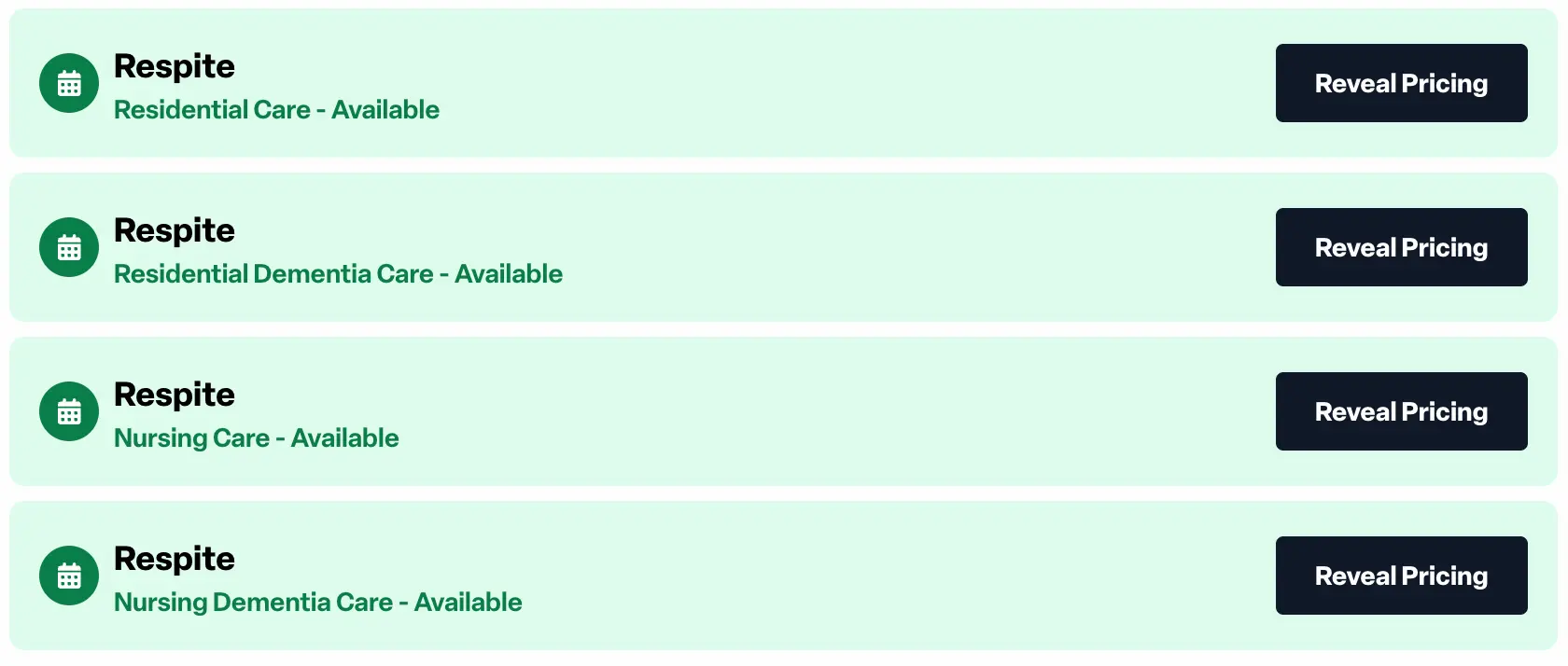Short-Term Respite Care | What Is Respite Care and Where Is It Available?

Estimated Reading Time: 11 minutes
Short-term respite care is a temporary form of care, often given in a care home or through care at home. Here, the person you care for will be looked after for a couple of weeks while you take a well-earned break from your caregiving responsibilities.
Short-term respite care is often used by people who care for a family member so they can rest and recuperate, go on holiday or take care of other important tasks.
This article explains what short-term respite care is, where it can be given, the care and support provided, whether you need it, how much it costs, the benefits and how to find it.
Need to find respite care fast?
Browse the best respite care homes in your area.
In this article:
- What is short-term respite care?
- Where can respite care be given?
- What care and support are provided through respite care?
- What to expect from respite care
- Signs you need respite care as a carer
- How long does respite care take to organise?
- How much does respite care cost?
- What are the benefits of respite care?
- Find respite care near you
What Is Short-Term Respite Care?
Short-term respite care is a temporary form of care, often for one, two or three weeks at a time, designed to provide relief and support for primary caregivers who need a break from their caregiving responsibilities.
Short-term respite care gives unpaid carers the opportunity to look after their own needs. They may choose to rest and relax, go on holiday or take care of medical appointments or other personal commitments.
Taking this break can help to prevent caregiver burnout, as it provides an opportunity to recharge physically, emotionally and mentally.
During short-term respite care, the person receiving care will have access to a range of services and support, depending on their needs. This includes assistance with personal care, daily tasks, companionship and administering medication.
Short-term respite care can be arranged on a planned basis, allowing caregivers to schedule breaks in advance. It may also be available in emergency situations when caregivers require immediate relief.
Short-term respite care can be given in a respite care home, through care at home or in a different setting such as an adult day care centre.
Where Can Respite Care Be Given?
Respite care homes
Respite care is most commonly provided within a respite care home. A respite care home will look after your loved one on a short-term basis while you take a well-earned break from your caregiving duties.
In a respite care home, carers will speak to you and your loved one to work out their care needs, along with their likes and dislikes, so the service is as tailored and specific as possible. Your loved one will be supported in a home-from-home environment, with all their personal care needs and any other care needs taken care of.
A respite care home usually has a minimum respite stay of one to three weeks. Care can sometimes be organised within 48 hours of an initial enquiry, though it can often take longer than this, depending on a home’s availability.
Some respite homes take advance bookings, making it easier for you to plan ahead. For example, if you want to go on holiday, you can match the dates with when you plan to take this. In a respite care home, it’s usually a case of calling a couple of weeks before you need care to check availability.
Respite care at home
Respite care can also be given in the comfort of your own home. This short-term care most commonly lasts for a couple of weeks.
Respite care at home is often required when somebody needs temporary support while recovering from an illness or injury, much like a convalescent care home. It’s also required when the main carer takes a break from their caregiving responsibilities.
Respite care at home can either be domiciliary care (where a respite carer looks after you for several hours a day) or live-in care (where a respite carer temporarily moves in with you).
Day care services
Adult day care services provide an environment for adults with additional care and support requirements to be looked after throughout the day. Care is provided as needed, often along with activities and meals.
As people attend day care services daily, this is considered short-term respite care.
Adult day care services can be provided in a specialist centre or a community building such as a village hall. They can also be given in a care home, with many of the care homes we’re partnered with offering this service. Each of our care home listings states the additional elderly care options available, such as day care.

We’re here to help you find the right respite care home for you or your loved one. You can request a free list of respite care homes from our care experts, who will then share homes matching your budget and location. You can also search for a respite care home through our easy-to-use directory.
What Care and Support Are Provided Through Respite Care?
Exactly what’s on offer will vary from care home to care home and from home care agency to home care agency:
Personal care - Helping you use the toilet, get dressed and undressed, get in and out of bed and wash yourself
Mobility support - Helping you get from one place to another, often with the use of specialised equipment like hoists
Assistance with daily tasks - Preparing and cooking meals, washing, cleaning, looking after any pets, gardening, shopping and running any other errands
Companionship - Keeping you company throughout the day
Specific nursing procedures - PEG feeding, stoma care, wound dressing and administering intravenous drugs
Additional specialist care - Supporting people with a condition such as dementia, Parkinson’s disease or cancer
What To Expect From Respite Care
Before receiving respite care, your loved one will have their needs assessed. An assessment helps to determine the level of care your loved one requires during the respite period.
The length of respite care will have also been decided. The minimum duration for respite (at home or in a care home) also varies. One or two weeks is a typical minimum duration. Some respite providers offer minimum respite for less than one week, but this is much much rarer.
Before respite care begins, paperwork must be agreed upon and signed, including consent forms and relevant medical documentation. This makes sure the care provider has all the information they need.
There may be a handover meeting on the first day of respite care to discuss the individual’s care needs, preferences, medication and other relevant information. This also makes it easier for carers to provide care in a way that best suits your loved one.
During the respite period, your loved one will be cared for by care home staff or home carers, according to their assessed needs. This could include assistance with personal care, medication management, cooking meals or specialised forms of support.
Throughout the respite period, carers may update family members on the individual’s wellbeing and any notable developments.
Signs You Need Respite Care (As a Carer)
- You find yourself feeling overwhelmed by the demands of caregiving. You may be feeling physically or emotionally exhausted, impacting your own health
- You find it difficult to make time for yourself, your personal interests or other family members
- You need help juggling responsibilities like caregiving, work and other relationships. Your relationships may be strained as a result of these multiple responsibilities
- You’re concerned about the quality of care you’re providing, due to caregiver burnout or other factors
How Long Does Respite Care Take To Organise?
The time taken to organise respite care varies from home to home and agency to agency. Some care homes and home care agencies can arrange respite care in 48 hours or less, while others can take a few more days.
Respite care in a care home typically takes longer to arrange, as you’ll likely want to view the home before any assessments are undertaken. Meanwhile, with home care, it’s simply a case of an agency checking if they can offer the required support and have availability. If they do, they can then perform an assessment as early as the next day.
How Much Does Respite Care Cost?
In a UK care home, there are four types of respite care your loved one can receive. We’ve summarised the cost of these in the table below when paying for your own care, based on our care home partners:
| Respite residential care | Respite residential dementia care | Respite nursing care | Respite nursing dementia care | |
|---|---|---|---|---|
| Per day | £188 | £198 | £225 | £236 |
| Per week | £1,317 | £1,387 | £1,575 | £1,649 |
| Per month | £5,707 | £6,010 | £6,825 | £7,146 |
Respite care at home costs depend on your location and the type of home care required. Hourly care costs an average of £28 per hour. When receiving this for 20 hours a week, you’d pay around £560 a week and £2,427 a month. Live-in care costs an average of £228 a day, £1,596 a week and £6,916 a month.
Who pays for respite care?
Whether your loved one pays for respite care at home depends on the total value of their savings and income.
Whether your loved one pays for care in a respite care home depends on the total value of their savings, income and assets.
This value will be determined by a financial assessment, which immediately follows a care needs assessment. If the total value is above a certain threshold (depending on where they live), they’ll pay for their own care. Their local authority will pay for some or all of their care if it's below the threshold.
If your loved one requires nursing care, they could be eligible for NHS-funded nursing care. This is for people receiving nursing care in a care home. If eligible, the NHS will pay towards some of their care fees. They could also be eligible for NHS continuing healthcare, where the NHS fully pay for their care fees. You can only qualify for one of these forms of NHS funding.
When self-funding their own care, your loved one could qualify for Attendance Allowance or Personal Independence Payment (PIP), depending on whether they’re above or below the State Pension age.
What are the Benefits of Respite Care?
For the person receiving care
Professional care and support - Whether in a care home, at home or in a different setting, respite care is given by trained professionals who can offer specialised support tailored to the individual’s needs. Through respite care, physical and emotional health will both be looked after
Enhanced wellbeing and social interaction - In a setting such as a care home, respite care provides the opportunity to spend time with new people, such as fellow residents, helping to reduce feelings of isolation or loneliness. In a respite care home, you’ll also have the opportunity to engage in fun activities
For the carer
Spend time looking after yourself - A carer can spend a respite break doing the things they love, whether this is pursuing hobbies, going on a holiday, resting or simply taking care of other life admin-related tasks
Avoid caregiver burnout - Regular breaks from your caregiving responsibilities are crucial in avoiding caregiver burnout. During this break, your stress levels may be reduced, and your overall mental health will benefit, allowing you to continue providing care in the long term if needed
Peace of mind - Knowing that your loved one such as an elderly parent is being looked after in a safe and supportive environment will minimise any care-related stress or anxiety
Maintain relationships - Taking a break from your caregiving duties allows you to spend more time with family and friends
Find Respite Care Near You
You can find a fantastic range of respite care homes across the UK through Lottie.
Each of our care home listings states the types of respite care offered and whether they currently have bed availability. Our listings are also packed with other helpful information, such as the facilities and activities available to residents.

You can also find respite home care through Lottie. Each of our home care listings states whether care can be offered on an ongoing or fixed-term basis. Ongoing care is required indefinitely (so there’s no end date in mind), while fixed-term care is given for a specific period.

Lottie matches care seekers with the best respite care homes for their needs. You can also request a free list of care homes from our care experts, who will share homes matching your budget and location.
Frequently Asked Questions
How quickly can you get someone into respite care?
How quickly you can get someone into respite care depends on availability and the setting they wish to receive care in.
Some home care agencies and care homes can provide respite care within 48 hours. Respite care in a care home usually takes longer to arrange, potentially a few days or longer, as there are more steps to the process, such as viewing the home.
How much is respite care per day in the UK?
In a care home, the average cost of residential respite care is £188 per day. This rises to £225 per day for nursing respite care. At home, domiciliary care costs an average of £28 per hour (so this would cost £224 a day if it was needed for eight hours each day), while live-in care costs an average of £228 per day.
Does the NHS pay for respite care?
If respite nursing care is required, the NHS may pay for some or all of it.
NHS-funded nursing care is for people receiving nursing care in a care home. Here, the NHS will pay towards your care fees.
There’s also NHS continuing healthcare. This is for people who have been assessed as having a ‘primary health need’. If eligible, the NHS will fully pay for your care fees.
You can only be eligible for one of these forms of NHS funding.



